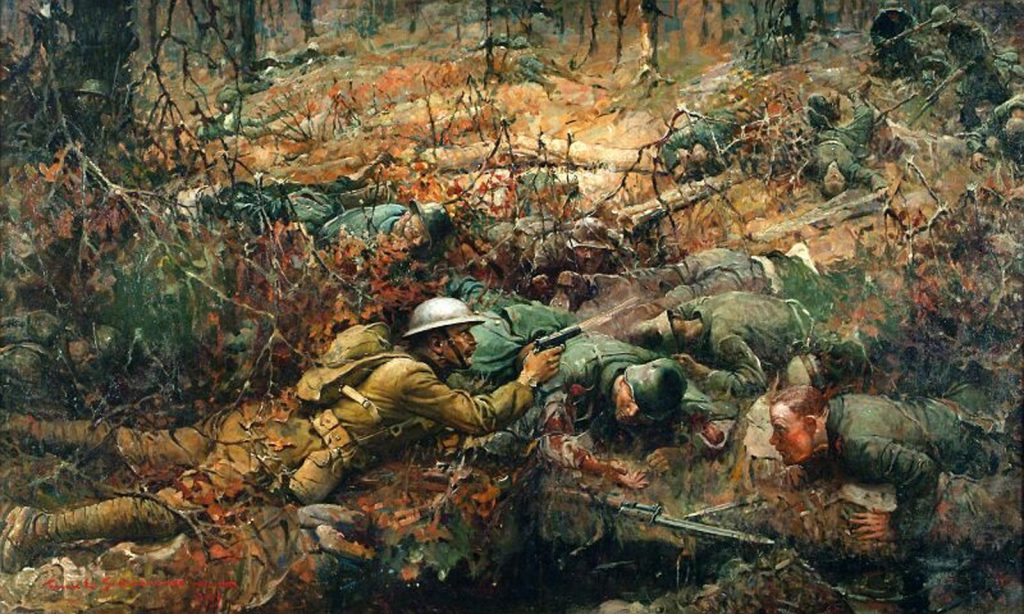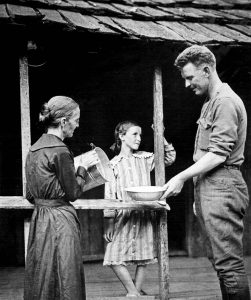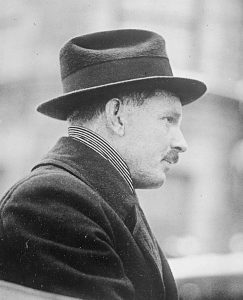
It’s Memorial Day. People all across the United States are commemorating soldiers that have died in service to their country. So, today on History’s Badasses, we’re going to cover one of America’s War Heroes: Alvin C. York. Last week, we covered Harald Fairhair, a viking king who united Norway. Our badass this week was an ordinary blacksmith who was drafted into the US army during WWI. While serving in the 82nd Infantry Division, this guy took command and captured 132 German soldiers all by his badass self. This is his story.
Early Life

Alvin C. York was born to a family of rednecks from Tennessee in a two-room log cabin near Pall Mall. He was the third of eleven children born to the Yorks on a wintry December day, December 13, 1887 . They were an impoverished family that had to harvest their own food and sew their own clothing. Each of the York sons attended school for only nine months and then withdrew from their education because their father needed help supporting the family. When Alvin’s father died in 1911, Alvin had to help raise his younger siblings. He worked in railroad construction and as a logger. But when he wasn’t working, he was drinking. He spent most of his formative years getting drunk and into crazy bar fights, but when one of his close friends was killed in one, he swore off alcohol completely and named himself a pacifist. York attended church regularly and often led hymn singing, and a revival meeting in 1914 led him to a conversion on January 1st, 1915.
Service in the Military
World War I began, and Alvin started to worry. He didn’t want to be drafted into the army, as he was opposed to all forms of violence. But, on June 5, 1917, Alvin York registered for the draft just as American law required every young man between the ages of 21 and 31 to. When he registered, he answered the question: “Do you claim exemption from draft (specify grounds)?” with: “Yes. Don’t want to fight”. His claim for conscientious objector status was denied, so he appealed.
Alvin was out of luck. In World War I, conscientious objector status was not reasonable grounds to be exempt from military duty. In November of 1917, Alvin was drafted and began training at Camp Gordon in Georgia.
York began his service in the company G, 328th Infantry Regiment, 82nd Infantry Division at Camp Gordon. He had long talks with his commander about his conflict between his pacifist beliefs and his military training. His C.O. was a devout Christian himself, and cited Biblical passages about violence and war to persuade York that it did not contradict the Bible to fight for the good one one’s own country and the safety of his loved ones. He granted York a 10-day leave to visit home, and York returned convinced that God meant for him to fight and would keep him safe. He served with his division in the St. Mihiel Offensive.

York became famous for his service at the Decauville rail-line in France, on October 8th, 1918. His actions there would earn him the US Medal of Honor. There, York wrote in his diary that the Germans had them pinned down with machine guns on the heights, hitting the American troops hard. Under the command of Sergeant Bernard Early, thirteen privates had been ordered to infiltrate the German lines to take out those machine guns. The group had been trying to flank the Germans when the machine gun fire caught them, stopped them in their tracks, killed six and wounded three. As the sergeant and his men stayed under cover, York moved on ahead, alone.
York effectively sniped out the men at the machine guns. He said in his journal “I was sharp shooting…I didn’t want to kill any more than I had to. But it was they or I. And I was giving them the best I had”.
While York was trying to take down the machine guns, he was charged by six German soldiers with fix bayonets. Alvin was out of ammo for his rifle, so he drew his pistol and shot all six before they could even get near him.
The German First Lieutenant in charge of the battalion York was trying to take down completely lost all of his ammo while he was trying to kill York. When he realized how many people he was losing, he offered to surrender the entire unit. York, not wanting to spill any more blood than he had to, accepted. When York reported back to his C.O., the General said: “Well, York, I hear you’ve captured the whole damn German army.” To which York replied: “No, sir. I got only 132.”
Alvin C. York was single-handedly responsible for wiping out the German machine guns and artillery in the area. His actions enabled his unit to renew its attack to capture the Decauville railroad.
York was promoted to Sergeant, and received the Distinguished Service Cross. He recieved medals from French and Italy. All of his decorations eventually totaled up to fifty in all.
Fame and Later Life

After Alvin returned home, his accomplishments went mostly unnoticed until April 26, 1919, when a journalist told his story to the world and labled him as a public hero. After that Alvin York became famous across the United States as a symbol of US heroism, patriotism, and skill. He refused many offers to profit from his fame, including thousands of dollars offered for appearances, product endorsements, newspaper articles, and movie rights to his life story. Instead, like the true badass he was, he chose to lend his name to charities and civic causes. He formed the Alvin C. York Foundation to increase education opportunities in his home state. His health began to slowly deteriorate in the 1930s, but even so, During WWII, he tried to re-enlist, but was denied.
He suffered from poor health for the rest of his life. He and his wife, Grace, had eight children: six sons, two daughters. One of his sons was killed in the line of duty while serving as a constable. York died at the Veteran’s Hospital in Nashville, Tennessee, on September 2, 1964, of a cerebral hemorrhage. His heroic life story was told in the film Sergeant York, and after his death his wife sold most of the family farm to the State of Tennessee. It’s now open to visitors as the Sgt. Alvin C. York State Historic Park.